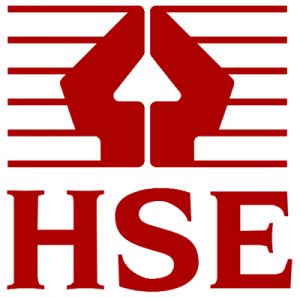Health & Safety Training – the 5 key benefits
Legislation requires every employer to provide whatever information, instruction, training and supervision is necessary to ensure the avoidance of accidents or long-term effects to employee health.
In addition to the most obvious benefits, training your staff in health and safety also gives you reduced insurance premiums, a boost to your reputation, an increase in productivity, reduced downtime due to absence and also protects you from being taken to court for negligence, or even worse, facing imprisonment..
So, this week I thought that I would look at the benefits to your company of providing good health and safety training.
All businesses have a legal duty to provide information, training and supervision to employees to enable them to carry out their work safely, not just to front-line staff but also to directors, managers and those in other key roles.
Here at The Wilkins Safety Group Limited, we offer a range of health and safety training courses that will help you to protect your workforce and your business from the many dangers that exist in any workplace. So let us take a look at those health and safety training benefits in more detail.
1. A Reduction in Your Insurance Premiums
If you can prove to your insurance company that you employ managers trained in a range of health and safety issues you can expect reduced premiums on your public or employee liability insurance.
A company or organisation with trained health and safety managers and supervisors is less likely to face claims due to accident, illness or injury.
2. Good Health and Safety Training Could Give A Boost to Your Business Reputation
An accident in your workplace could be the downfall of your business if you are found to have been negligent. Negligence comes in many forms from failure to provide adequate training on machinery and equipment to asking an employee to work too many hours or not training them in such matters as fire evacuation procedures.
You have a duty of care towards your employees to ensure they are safe and healthy during their time in your employment whether they are out on the road, working on various sites or working in an office.
A company that recognises good health and safety training is essential will often have an excellent safety record and a reputation to match.
3. An Increase in Productivity
When employees are fit and well they are able to work at a faster pace and fully focus on the job at hand. A staff member with a bad back on the other hand will be less able to carry out certain tasks and will be focused more on the pain they are experiencing.
A well trained health and safety manager will recognise problems when they occur and prevent accidents and injuries occurring and make arrangements for staff experiencing health problems to get the assistance they need.
4. Reduced Rates of Absence
One of the aims of health and safety training is to help staff and managers to reduce the amount of employee illness and absence. Having received the appropriate training, your managers will be aware of potential problems and the steps required to reduce the risks.
This could involve anything from ensuring proper ventilation is available in enclosed areas or supplying adequate hand washing stations to prevent the spread of viruses.
5. Legal Protection Against Damages
It is a legal requirement for all companies to take reasonable steps to protect their employees from accidents and illness. If a business owner is found to be negligent, they could be held responsible and face heavy fines and even imprisonment. The right level of health and safety training helps to ensure that you are meeting your legal duties and that you are less likely to be prosecuted for negligence.
So what training should you give and what is available?
To ensure that you invest your resources appropriately you will need to analyse your requirement for health and safety training. Consider the roles listed below. Are you sure you are equipping key staff with the necessary skills and knowledge to play their role in preventing accidents and ill health?
- Board directors (executive and non-executive)
- Senior managers (and not just operations managers) These people should attend Health & Safety for Directors and Senior Managers. A one-day course which raises awareness of the importance of health, safety and welfare among directors and senior managers.
- Middle managers
- Team leaders
- Key functional roles (not just health and safety staff but fleet, HR, facilities, IT, procurement and finance staff)
- Supervisors (especially of young workers) These people should attend a Level 2 Award in Supervising Staff Safely. A two-day exercise which is aimed at managers, supervisors, team leaders, department heads requiring gaining practical understanding of health and safety, and equipping them to undertake a realistic, workplace related assessment that leads to a level 2 qualification.
- Key skill groups (designers, craftsmen, maintenance staff, drivers, admin staff etc.)
- Trainees
- Safety representatives
- All new starters. These people require a Level 1 course in General Health & Safety Awareness as a minimum. This course should cover the main areas of risk for the works they are involved in whether that is on a construction site or in an office.
Now the three courses mentioned above are generally best delivered by attending a classroom-based course.
The Wilkins Safety Group are a British Safety Council approved Training Centre.
- This allows us to run Ofqual accredited qualifications. These Qualifications sit on the Regulated Qualifications Framework and include such courses as
the CSCS Green Card which was developed in partnership with the Construction Industry Training Board (CITB) for people wishing to apply for a CSCS card. - Level 2 & 3 Supervising Staff Safely mixed with Risk Assessment which is comparable to IOSH Managing Safely
We are also an Association for Project Safety accredited Trainer for construction-based training.
Other courses are approved by The Highfield awarding body for compliance
We have also form relationships with other trainers providing City and Guilds, Lantra Awards, CITB CSkills Awards and NPORS. So we can provide you with Asbestos Awareness, First Aid, 2 Day SSSTS training and 5 Day SMSTS training.
In addition to the courses mentioned above there are a number of sets of regulations under the HASAWA which include general or specific health and safety training requirements. Examples include regulations covering:
- Asbestos – The Control of Asbestos at Work Regulations
- First aid – The Health and Safety (First-Aid) Regulations
- Noise and vibration – Noise at Work Regulations (NAW Regs) and The Control of Vibration at Work Regulations
- Transport of dangerous goods – The Transport of Dangerous Goods (Safety Advisers) Regulations
- Confined spaces – The Confined Spaces Regulations
- Display screen equipment – The Health and Safety (Display Screen Equipment) Regulations (DSE Regs)
- Flammable materials – Dangerous Substances and Explosive Atmospheres Regulations
- Lifting operations – Lifting Operations and Lifting Equipment Regulations
- Personal protective equipment – Personal Protective Equipment at Work Regulations (PPE Regs)
- Substances hazardous to health – Control of Substances Hazardous to Health Regs (COSHH)
- Construction – The Construction (Design and Management) Regulation
- Electricity – Electricity at Work Regs
- Fire precautions – The Regulatory Reform (Fire Safety) Order 2005
- Manual handling – Manual Handling Operations Regulations (MHO Regs)
- Work equipment – Provision and Use of Work Equipment (PUWE) Regs
There are many other topics where the HSE has issued key pieces of guidance and on which training should be provided. Some examples include:
- Accident Investigation
- Driving at work
- Lone Working
- Risk Assessment
- Stress
These training courses can be delivered in the classroom setting or, as is becoming more popular, by E Training.
The Wilkins Safety Group have now launched our much-anticipated health and safety e-learning
There are many e-learning benefits: You can drastically cut your risks and improve effectiveness. Staff retention and productivity will increase and safety will improve. It’s that simple.
The health and safety e-learning training courses are dynamic, engaging and very interesting. As the content is interactive your staff will learn quickly, retain more knowledge and enjoy the training.
The self test section means that they get to see how much they have learnt and if necessary, revisit any areas that they have failed. There is an option to print a certificate for each user who has passed which is personalised with their details.
By providing high quality accurate health and safety information to your staff you will build a culture of safety and help increase staff retention, productivity as well as protecting yourself from damaging and expensive legal action.
One of the major e-learning benefits is the fact that the system provides an audit trail which tracks your staff progress and you can make an accurate assessment of their understanding.
How is the training delivered?
The Wilkins Safety Group e-learning system is delivered over the Internet, all you need to access your system is a PC with Internet browser (you will also need your username and password).
The system is hosted on our secure server. The server carries an SSL certificate and all data is encrypted for maximum security. We manage the server that means that you have no IT worries.
What is the cost of these courses?
Companies will be able to buy credits. Each of these credits will allow 1 allocated person access to 1 course. The cost of these credits will reduce based on the number of credits purchased. See pricing chart below:
| No of Credits | 1-5 | 6-10 | 11-20 | 21-30 | 31-40 | 41-50 | 51-75 | 76-100 | 101-150 | 151-200 | 201-250 |
|---|---|---|---|---|---|---|---|---|---|---|---|
| Cost of Credit | £19.99 | £17.99 | £16.99 | £15.99 | £14.99 | £13.99 | £12.99 | £11.99 | £10.99 | £9.99 | £7.99 |
Below is the list of the first 17 e-courses that are now available
- Asbestos Awareness Interactive
- COSHH Interactive
- DSE Equipment
- DSE Workstation Assessment
- Electrical Safety
- Environmental Awareness
- Fire Extinguishers
- Fire Safety Interactive
- Fire warden Interactive
- First Aid
- Food Hygiene
- Food Hygiene Level 2
- Health and Safety Induction Interaction
- Manual Handling
- Protection against effects of Noise
- Risk Assessment
- Stress in the Workplace
We would love to hear any expressions of interest or of any other courses that you would like us to develop.
We are looking at Permits to Work; Slips, Trips and Falls and Working at Height to follow soon after
If you would like any further help or support, please please contact us by phone 01458 253682, email or via our Facebook page or by Twitter.
Taunton & Somerset CPD Group at The Exchange House Taunton
Please remember that we now run these CPD events at the Exchange House, 12 – 14 The Crescent, Taunton TA1 4EB on a fortnightly basis
The next of the CPD events is listed below.
As previously requested, if you could let us know whether or not you can attend it would be greatly appreciated. Also, if you would like to give a talk, or know of somebody who would, please contact Jon at [email protected]
Our next Seminar will be on Wednesday 29th May 2019. Could you please arrive by 12:30pm prompt.
Our speaker for this one is Reinhardt Kirton of Thermorend Limited will talk about Specialist render and external wall insulation systems.
If you haven’t already booked your place, or if you are not on the CPD Seminar mailing list but would like to be please drop Jon an email and he will deal with your request.
As per our last one if you could let Jon know whether or not you can attend within 7 days of receipt of his email, it would be greatly appreciated.
Contact Details [email protected] 07831 714199 or 01458 253682.
Then we have Sam Hagley of Venesta who will talk about Designing Washrooms for different applications
This talk will be on Wednesday 12th June and will be the last one until 11th September
Trucker making mobile card payment caught
Trucker making mobile card payment caught by HGV supercabs
Highways England has released footage of a lorry driver using a mobile phone to make a credit card payment as he travels along the M40 near Leamington Spa.
The trucker, who was seen holding his credit card and phone in each hand, was among over 3,000 dangerous drivers filmed by three unmarked HGV ‘supercabs’ in the past year to improve safety on England’s high-speed roads.
The footage can be seen here.
The cabs, which are funded by Highways England, have travelled thousands of miles since they first took to the road 12 months ago and police offers inside the vehicles have recorded over 3,500 offences.
All three cabs are now being used for a week of action on the M1 to improve safety on England’s most used motorway.
Highways England’s traffic officers will also be joining forces with the emergency services from Monday 13 May to provide free tyre checks and safety tips to drivers at motorway services by the M1.
Richard Leonard, Head of Road Safety at Highways England, said:
“Hundreds of thousands of drivers use our roads every day and the vast majority are sensible behind the wheel but some are putting themselves and others at risk.
“We introduced the three new HGV supercabs last year to help keep the roads safe and tackle dangerous driving by people who have either got into bad habits or are simply ignoring the law.
“The cabs have helped to identify over 3,000 unsafe drivers over the past year, and we hope our week of action on the M1 will encourage everyone to think about what more they could do to improve how they drive.”
The three Highways England supercabs patrol motorways and major A roads across England, and have been used by 29 police forces over the past year in a safety initiative known as Operation Tramline.
They allow police officers to film evidence of unsafe driving behaviour by pulling up alongside vehicles, and drivers are then pulled over by police cars following a short distance behind.
The supercabs have a de-restricted speed limiter which means they can travel at speeds up to the national speed limit, and flashing lights have been installed for use by police forces in an emergency.
Other footage captured using the cabs in their first year included a van driver who was spotted with no hands on the wheel as he used one hand to change gear and the other to hold his mobile phone. The incident happened as he travelled along the A38 near Derby, even though he pulled into a service station to stop just a few seconds later.
Common offences
Around one in three of the drivers filmed breaking the law by the supercabs had someone in their vehicle not wearing a seatbelt, despite statistics showing that one in four people killed in car crashes in 2017 were not wearing seatbelts.
Drivers illegally using a mobile phone while driving was the second most common offence captured by the cabs, with the latest figures showing that mobile phone use is a factor in one death on the roads every 12 days.
The most common offences included:
- not wearing seatbelt – 1,195
- using mobile phone – 1,062
- not in proper control of vehicle – 262
- speeding – 118.
Police officers issued 462 penalty charge notices and filed 2,533 traffic offence reports – usually requiring drivers to attend a driver education course. There were also 73 prosecutions for more serious offences.
£500k fine in worker death case
A waste management company has been fined £500k after an employee was killed when he was struck by a reversing JCB loading shovel.
Newcastle upon Tyne Crown Court was told that on 15 June 2015 a wheeled front-loading shovel was being operated in the main waste processing shed at Sanders Plant and Waste Management Limited’s waste recycling facility in Morpeth.
The vehicle, driven by another employee, was loading waste into both a trommel (a large waste separation and sifting machine) and a parked haulage vehicle. During the course of this operation the vehicle struck site operative George Richardson.
He was fatally injured and died at the scene from his injuries.
Not implemented
The HSE’s investigation found evidence of a lack of pedestrian and vehicle segregation in the waste shed meaning that pedestrians and vehicles could not circulate in a safe manner. The company had carried out a risk assessment prior to the incident that identified some control measures to reduce the risks from operating the loading shovel and a Fork Lift Truck on site. However, these control measures had not been fully implemented nor were they sufficient to manage the risk of collision between vehicles and pedestrians. Furthermore, there was no risk assessment or traffic management plan considering the safe movement of vehicles across the site.
Sanders Plant and Waste Management Limited of 40 Butterwell Drive, Pegswood, Morpeth pleaded guilty to breaching Regulation 2(1) of the Health and Safety at Work etc. Act 1974. It was fined £500,000 with costs of £14,041.96.
HSE inspector Laura Catterall commented after the hearing:
“The HSE investigation found an inadequate assessment of the risks of vehicle movements in the waste shed and a lack of segregation of vehicles and pedestrians. There are more than 5,000 accidents involving transport in the workplace every year, and, like in this case, sadly, some are fatal.
“A properly implemented transport risk assessment should have identified sufficient measures to segregate people and vehicles and provide safe facilities.”
Kerry Richardson speaking on behalf of George’s family also said:
“More than anything my whole family don’t want anyone else to lose their life and another family to go through what my family has gone through and is still going through.”
Remember
Unlike other organisations who send out newsletters giving you a little titbit of information, then stating that if you want to follow the full link or read the full story or get more information you must pay to subscribe to their service.
- Our newsletter service is FREE,
- The links we supply are FREE,
- The helpline advice is FREE.

If you find this newsletter service of use and you think others might also find it useful, then kindly pass it on and ask them to subscribe for free, so they can continue to receive it in their own right.
Also contact us if you have a particular health and safety subject or question you would like covered
If you have any queries on any health and safety matter, please contact Jon Wilkins on 01458 253682 or by email on [email protected]


